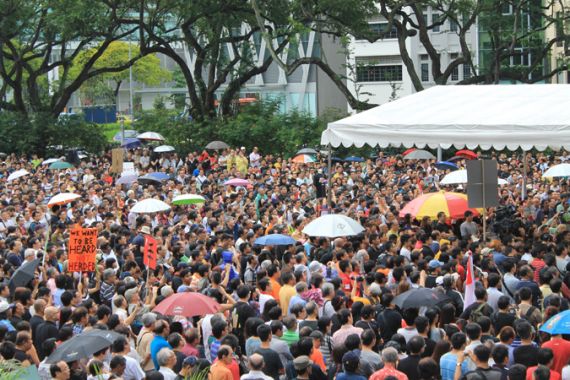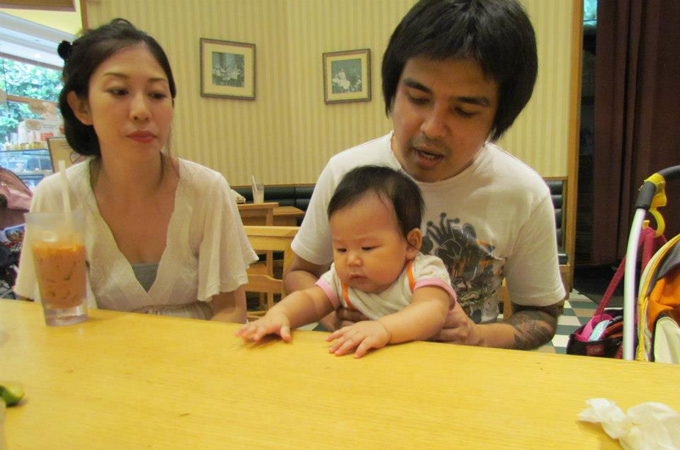Singapore seethes over population plan
Proposal to boost city state’s population prompts rare protest, signalling growing dissent over influx of foreigners.

Singapore – Thirty-year-old Hayatt Shah made the most difficult decision of his life last month.
The Singapore native gathered his belongings and left behind his family and friends to begin a new life in Japan with his wife and six-month-old daughter.
High housing prices drove him to move from Singapore, explained Shah, who added he has no regrets leaving a country he no longer recognises. “I refuse to pay such a high price to live in a box that I have a lease on for 99 years. It’s crazy that property prices here in Saitama [in Japan] are more affordable than properties in Singapore.”
Like many of his fellow citizens, the musician and English instructor found it increasingly difficult to sustain a comfortable lifestyle in Singapore, where he was born and bred. “It is the simple fact that I don’t feel like I am home anymore in Singapore,” he said, which spurred him to move.
Singapore’s success story is relatively well-known. Having transformed itself from a tiny island nation with no natural resources to one of the richest countries in the world, Singapore prides itself on its booming economy, sustained by encouraging foreign investment and migrant labourers.
 |
| Disenchanted Hayatt Shah recently moved his family to Japan |
But despite being the third-most densely populated country in the world, Singapore’s government recently announced plans to increase its total population from 5.3 million to 6.9 million by 2030. The move caused a public outcry, with thousands taking to the streets on Saturday in protest.
An aging population coupled with dwindling birth rates, escalating housing prices, overcrowding, and caving infrastructure are just some of the factors responsible for the rising dissent among Singaporeans.
Population plans
In January, Singapore’s government – which has been led by the People’s Action Party since 1959 – introduced two proposals. The first was its “White Paper on Population”, which outlined a strategy to ensure sustainable population levels in the face of low birth rates and an aging society. Shortly thereafter, a plan to increase Singapore’s land area by nearly 8 per cent was announced to accommodate the new population.
In addition to the number of foreigners, an estimated 30,000 new permanent residents – a status given to foreigners who live in Singapore for long periods of time – will also be added each year.
“The White Paper is about mitigating the problems of our aging population and low birth rates, so as to secure Singapore’s future,” said Singapore’s Prime Minister Lee Hsien Loong in a post on his Facebook page. “Our priority is to maintain a strong Singaporean core by encouraging Singaporeans to get married and have children. We will reduce inflow of foreign workers, moderate flow of new citizens and maintain [permanent resident] population at about present size.”
Lee added a disclaimer that the government was not aiming for 6.9 million population, explaining the figure “is just a basis for us to plan our infrastructure”.
What shocked many was the report’s prediction that the country’s population will start to decline by 2025, with more than 900,000 Singaporeans – more than a quarter of the number of citizens – retiring from the workforce. The report noted the country’s fertility rate has fallen for the past 30 years, and currently stands below the replacement level of two babies per mother.
In 2010, the World Bank estimated Singapore’s fertility rate to be just 1.2 births per woman – among the lowest rates in the world.
Rising public anger
|
“We are talking about an average increase of 100,000 people every year, so if you want to talk in terms of how crucial the impact will have on the next general election, I cannot exaggerate how important it is.“ – Chee Soon Juan, opposition leader |
The potential influx of more than 1.6 million additional people has caused rare demonstrations in this island nation. Although the government stressed it would maintain a strong Singaporean core in spite of an incoming surge of foreigners, the majority of Singaporeans remain sceptical about its promise to deliver.
“It seems like anyone can just come into Singapore,” said Shah. “So will having 6.9 million people make Singapore a happier place? Is the economy really that important?”
Cassandra Siew, a housewife, said she doesn’t trust that the government will properly handle the population increase.
“The government has been singing the same song for years,” she said. “They keep adding more and more numbers year after year and assure us that it will be for the best, but when will it end? I’m sorry to say that I simply don’t buy into their promise of looking out for us anymore.”
Another Singaporean, marketing executive Ron Chew, said: “Our country is rapidly evolving, but Singaporeans are not reaping any of its benefits. Why should a foreigner be entitled to the same, if not more, privileges than a Singaporean?”
Eugene Tan, an assistant law professor at Singapore Management University, described a “spatial and mental sense of being overwhelmed felt by large swathes of the public”.
“Singapore is barely coping with the rapid influx of immigrants over the past decade, so there is the prevalent view that if we can’t cope with 5.3 million, how are we going to manage with 6.9 million within two decades?” said Tan. “There is a sense that the immigration policy will not be of benefit to the average Singaporean.”
But the public could be “reacting to a figure which they don’t really comprehend”, said Chua Beng Huat, a sociology professor at the National University of Singapore. “Whether 6.9 million will be the steady state population is completely speculative, and one should not be fixated by it.”
Many say a potential loss of Singapore’s national identity is an even more pressing problem than overpopulation.
Dissent against the population plans has been widespread, and a rare public protest on Saturday claimed to have drawn close to 5,000 people – an impressive feat in a country where many protests and public gatherings are illegal, and a police permit needs to be obtained to hold one.
“I want to express this displeasure faced by many Singaporeans on a united and peaceful platform,” said organiser Gilbert Goh, an unemployment counsellor who runs a support website for the jobless in Singapore.
“My greatest fear that arises from all this is the loss of our Singaporean identity, because it’s been eroded so much already and with the heavy influx, it may be destroyed,” said Goh. “And to add insult to injury, we are constantly being reminded that we could be the minority population figure in 17 years’ time.”
Political impact
Singaporeans have become increasingly vocal about the high influx of foreigners in recent years, demanding changes in the government’s relaxed immigration policies.
The opposition Singapore Democratic Party (SDP) recently launched its own population policy report, calling instead for a plan for businesses to favour Singaporeans when hiring and to tighten the screening of foreign professionals to wean businesses off of cheap foreign labour.
SDP party chief Chee Soon Juan said instead of moving towards a population of 6.9 million, the current population should be reduced “because of all the current problems Singapore is seeing”.
|
“I think political change is inevitable and controversial issues like the White Paper on Population might hasten the flight of support to the opposition.” – Eugene Tan, Singapore Management University |
Some think dissatisfaction with the White Paper could hurt the People’s Action Party (PAP) in the country’s elections in 2016.
“We are talking about an average increase of 100,000 people every year, so if you want to talk in terms of how crucial the impact will have on the next general election, I cannot exaggerate how important it is,” said the SDP’s Chee.
“Time is not on the side of the PAP,” said professor Tan. “I think political change is inevitable and controversial issues like the White Paper on Population might hasten the flight of support to the opposition.”The ruling party appears to have lost support in recent years. This was made clear in a by-election in January that the PAP was expected to win. Instead, unhappy Singaporeans delivered the party a devastating blow by voting in favour of the opposition candidate.
Political blogger Andrew Loh agreed. “I feel that the PAP government will see its share of the popular vote decrease further … I do not see these things improving enough by the next general election for people to reinstate the level of trust in the government which they had in the past.”